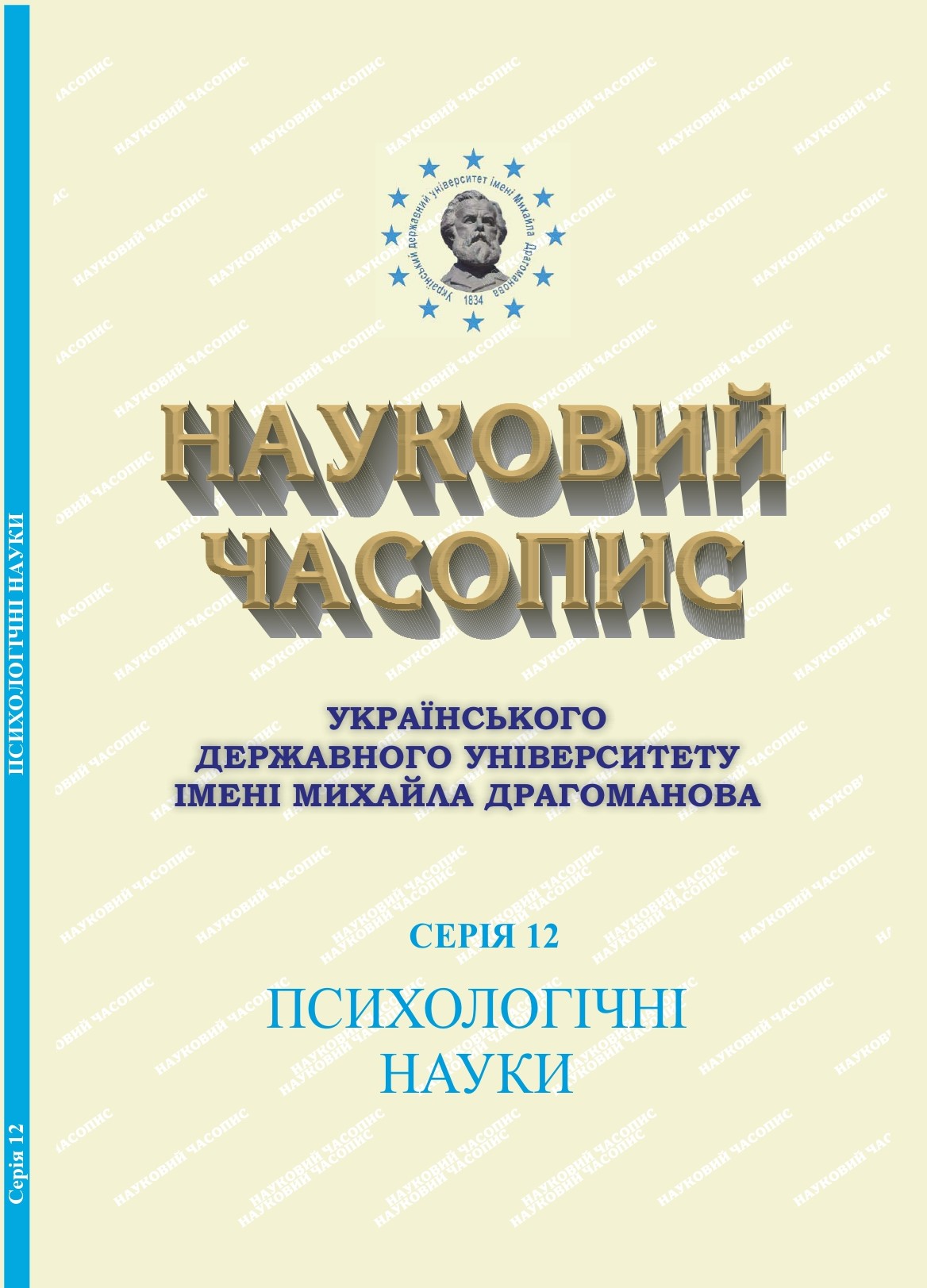ANALYSIS OF THE PHENOMENON OF HARDINESS IN THE PARADIGM OF MODERN SCIENCE
DOI:
https://doi.org/10.31392/UDU-nc.series12.2024.25(70).07Keywords:
the phenomenon of hardiness, hardiness, modern science, war, psychological resilience, personality, Ukraine.Abstract
The article is dedicated to the study of the phenomenon of hardiness within the paradigm of modern science. The concept of hardiness has been clarified, as it serves as a fundamental lever for the realization of personal potential in various life circumstances. The psychological content of the key components of hardiness has been revealed: Commitment (interest and active participation in life events), Control (belief in the ability to influence situations), and Risk acceptance (willingness to act in uncertain conditions). These components are crucial in the study of the phenomenon of hardiness. Emphasis is placed on the issues of hardiness that are being studied both abroad and in Ukraine, as well as on the perspectives of scientists who have recently implemented training programs aimed at enhancing the hardiness of youth and specific population groups. Based on the analysis of theories and viewpoints of contemporary Ukrainian and foreign scholars, the conditions that contribute to the development of personal hardiness have been identified and substantiated. The conditions for personality development under the influence of challenging life situations have been examined. The impact of increased hardiness on the physical and mental health of young people, as well as their successful adaptation to stressful situations, has been analyzed. One such situation is the war and military actions in Ukraine. The phenomenon of hardiness has been considered in terms of overcoming difficulties and neutralizing negative experiences throughout a person’s life, as individuals constantly face various challenges of different levels. Similarities in the patterns of reasoning among modern Ukrainian and foreign scientists regarding the phenomenon of hardiness and the prospects for further research on this issue have been identified. The psychological content of the mechanisms that enable individuals to withstand stress through factors affecting personal hardiness has been analyzed. Based on the studied material, a personal view on the phenomenon of hardiness, personal hardiness, and the associated mechanisms shaping their interaction has been formed. The author proposes a comprehensive vision of this issue, taking into account the ongoing war events in Ukraine.
References
- Varina, G.B. (2018). Zhittiestiykist osobystosti yak chynnyk psykholohichnoho blahopoluchchia maibutnikh psykholohiv [Personality resilience as a factor of psychological well-being of future psychologists]. Materialy Vseukrainskoi Internet-konferentsii «Suchasna nauka: tendentsii ta perspektyvy» – Materials of the All-Ukrainian Internet conference «Modern science: trends and prospects». (Melitopol, 2018). (pp. 28–34). Melitopol : Melitopolskyi derzhavnyi pedahohichnyi universytet imeni Bohdana Khmelnytskoho. Retrieved from http://eprints.mdpu.org.ua/id/eprint/3398/1/2
-tmp8FEE-Сучасна%20нвука-ВАБ.pdf [in Ukrainian]. - Datsenko, O.A. (2017). Aktualni problemy psykholohii v zakladakh osvity [Current problems of psychology in educational institutions]. Yu.M. Karandysheva, T.V. Senko & N.M. Tokarevoi (Eds.). Zbirnyk naukovykh prats – Collection of scientific works, 7, 17–27. Kyiv : TOV NVP «Interservis». Retrieved from https://scholar.google.com.ua/citations?view_op=view_citation&hl=ru&user=qaFSgQQAAAAJ&
citation_for_view=qaFSgQQAAAAJ:d1gkVwhDpl0C [in Ukrainian]. - Kuzmenko, O.H. (2021). Vzaiemozviazok samootsinky i tryvozhnosti molodshykh shkoliariv [The relationship between self-esteem and anxiety in younger schoolchildren]. Osvita i nauka – Education and Science, 1. Retrieved from https://e-journals.udu.edu.ua/index.php/on/article/view/809/782 [in Ukrainian].
- Larina, T.O. (2007). Zhyttiestiikist yak zhyttieve zavdannia osobystosti [Resilience as a life task of the individual]. N.V. Chepeleva (Ed.). Aktualni problemy psykholohii: Psykholohichna hermenevtyka – Current problems of psychology: Psychological hermeneutics, 2(5), 131–138 [in Ukrainian].
- Panchenko, V.O. (2016). Zhyttiestiikist yak faktor profesiinoi adaptatsii menedzheriv komertsiinykh orhanizatsii [Resilience as a factor of professional adaptation of managers of commercial organizations]. Candidate’s thesis. Kyiv [in Ukrainian].
- Tokareva, N.M. (2021). Labirynty doroslishannia: psykhichnyi rozvytok osobystosti pidlitkovo-yunatskoho viku [Labyrinths of growing up: mental development of the personality of adolescence and youth]. Kryvyi Rih : TOV «NVP «Interservis»». Retrieved from https://elibrary.kdpu.edu.ua/bitstream/
123456789/6084/3/%D0%92%D1%96%D1%80%
D0%B0%D0%B6%D1%96%20%D0%B4%D0%BE%
D1%80%D0%BE%D1%81%D0%BB%D1%96%D1
%88%D0%B0%D0%BD%D0%BD%D1%8F_compressed.pdf [in Ukrainian]. - Khaustova, O. (2009). Metabolichnyi syndrom Kh (psykhosomatychnyi aspekt) [Metabolic syndrome X (psychosomatic aspect)]. Kyiv : Medknyha [in Ukrainian].
- Chykhantsova, O.A. (2016). Deiaki aspekty vyvchennia problemy zhyttiestiikosti osobystosti [Some aspects of studying the problem of personality resilience]. Aktualni problemy psykholohii – Current problems of psychology, 2(6), 227–234 [in Ukrainian].
- Chykhantsova, O.A. (2018). Osoblyvosti proiavu komponentiv zhyttiestiikosti osobystosti [Peculiarities of manifestation of components of personality resilience]. Aktualni problemy psykholohii. Zbirnyk naukovykh prats Instytutu psykholohii imeni H.S. Kostiuka NAPN Ukrainy – Current problems of psychology. Collection of scientific works of the Institute of Psychology named after G.S. Kostyuk of the National Academy of Sciences of Ukraine, 5, 267–273. Retrieved from http://www.appsychology.org.ua/data/jrn/v6/i14/32.pdf [in Ukrainian].
- Bonanno, G.A. (2004). Loss, trauma, and human resilience: have we underestimated the human capacity to thrive after extremely aversive events. American Psychological Association. American Psychologist, 59, 20–28. Retrieved from https://scholar.google.com.ua/citations?view_op=view_citation&hl=uk&user=biNsm
j8AAAAJ&citation_for_view=biNsmj8AAAAJ:hWqix75wD0QC - Creed, P.A., Conlon, E.G., & Dhaliwal, K. (2013). Revisiting the academic hardiness scale: revision and revalidation. J. Career (Ed.) Journal of Career Assessment, 21, 537–554. Retrieved from https://journals.sagepub.com/doi/10.1177/
1069072712475285?icid=int.sj-full-text.similar-articles.6 - Maddi, S.R. (1987). Hardiness Training at Illinois Bell Telephone. J.R. Opatz (Ed.). Health promotion evaluation. (pp.101–115). Stevens Point (WI) : National Wellness Institute.
- Maddi, S., & Khoshaba, D. (1994). Hardiness and Mental Health. Journal of Personality Assessment, 63(2), 265–274.

